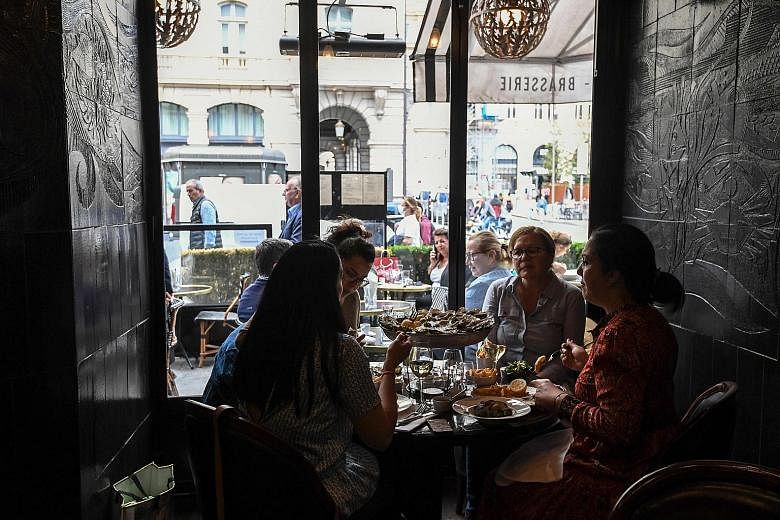PARIS • Restaurant and cafe owners in Paris cheered their chance to get back in business yesterday after the French government said they could once again open their dining rooms, three months after being shut to blunt the coronavirus outbreak.
The sooner-than-expected reopening for the Paris region was announced by President Emmanuel Macron late on Sunday, shortly before officials reported just nine Covid-19 deaths in the previous 24 hours - the lowest since March.
"The bulk of the epidemic is behind us," Health Minister Olivier Veran said yesterday, though he cautioned that "this doesn't mean we can stop fighting the virus".
Until now, restaurants in and around the capital could only serve clients on outdoor terraces, even as eateries in the rest of the country fully opened earlier this month.
"It's going to be a party," Mr Stephane Manigold, owner of four Paris restaurants, including the two-Michelin-starred Maison Rostang, told Agence France-Presse.
"We were waiting for the President's speech. Our teams are ready and they're eager to get back to work."
Mr Manigold made headlines last month after successfully suing his insurer, French giant AXA, to pay around €70,000 (S$110,000) in compensation for lost business.
Even in the rest of France, where restaurants were allowed to fully reopen on May 11, owners have had to remove tables to ensure a distance of at least 1m between diners.
Mr Didier Chenet, head of the GNI association of independent hotel and restaurant owners, estimates the social distancing rules have cut capacity by at least half.
"Being able to finally get back to work across all of France does bring a sigh of relief," he said.
But unless the government lifts the 1m rule, he said, "a recovery will be very slow, with economic conditions that are not viable for our businesses".
Foreign tourists, the key ingredient for success at Paris restaurants, in particular, are also not expected to arrive in pre-Covid-19 numbers any time soon, even as the European Union begins to tentatively open up borders within the bloc.
With French employers still being urged to have employees work from home whenever possible, lunch crowds also remain far from what they were before the outbreak, Mr Chenet said.
Other European nations, meanwhile, eased border controls yesterday as coronavirus cases declined after three months of lockdown, with Germans escaping to holiday destinations and French people streaming into Belgium to buy cheap cigarettes.
But Spain's continued closure, a patchwork of quarantine rules and remote working, mean pre-crisis travel levels are a way off.
Greek airports allowed more international flights as the country sought to salvage its summer. German tourists flocking to neighbouring Denmark caused an 8km queue, and Italians popped into France to buy lottery scratch cards.
Spain is permitting entry to a select group of holidaymakers from Germany as Madrid works out how to make mass tourism work now.
Sunseekers queued in Dusseldorf to board tour operator TUI's flight to Mallorca. "It'll be quieter than normal," said one mask-wearing tourist. "But it's a good feeling that it's all starting up again, that we can travel again."
The Schengen area of 22 EU countries, plus Iceland, Liechtenstein, Norway and Switzerland, operates control-free crossings. But for the past three months, they have been mostly closed to all but goods traffic and cross-border commuters.
European officials hope the lifting of internal border controls will allow a gradual reopening to other countries from next month and resuscitate a tourism industry that flatlined during the lockdown. Tourism and recreation make up almost 10 per cent of the EU economy, and even more in the Mediterranean countries, some of which were hit hardest by the pandemic.
In Greece, passengers arriving from airports deemed high-risk by the EU's aviation safety agency will be tested for the coronavirus and quarantined for up to 14 days, depending on the result. Restrictions remain for passengers from Britain and Turkey. Arrivals from other airports will be randomly tested.
Yesterday, the European Commission launched Re-open EU, an online site providing information on travel to and within EU countries, what coronavirus-related rules apply, and whether facilities such as hotels and beaches are open.
AGENCE FRANCE-PRESSE, REUTERS

